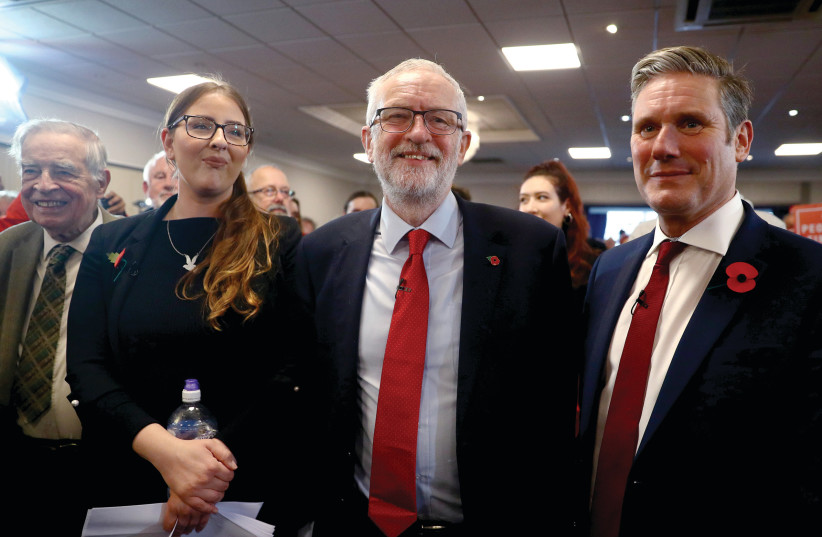The leader of the opposition in the UK and head of the British Labour Party, Sir Keir Starmer, denounced on Tuesday what he termed the “anti-Zionist antisemitism” that had taken root in his party, and insisted Labour does not support the Boycott, Divestment and Sanctions campaign against Israel.
Starmer was speaking at an annual event held by the Labour Friends of Israel lobby group, where he also lauded Labour’s historic support for Zionism and Jewish self-determination, said his party was ridding itself of the antisemitism that took hold under its previous leadership, praised Israel’s foundational principles of equality for all citizens, and reaffirmed Labour’s commitment to a two-state solution for the Israel-Palestinian conflict.
Under Labour’s previous leader, Jeremy Corbyn, who headed the party from 2015 to 2020 and took it in a hard-left direction, antisemitism became rampant among Labour’s ranks, often expressed in conjunction with anti-Zionist sentiment, with Corbyn himself accused of making antisemitic comments.
Labour under Starmer, who won the party leadership in April 2020, has made several institutional changes to the party to root out antisemitism and antisemites from its midst, while Starmer has also moderated its position on Israel.
Speaking at the Labour Friends of Israel event, Starmer noted that his wife is Jewish and that his family has therefore “always observed” some Jewish traditions, and that he and his wife are keen for their children to grow up knowing their history.

He also pointed out that on his first day as Labour leader he had apologized for the antisemitism that had taken hold of Labour, and apologized again, saying it was “a stain” on the party, going on to list the steps he has taken to combat the phenomenon.
“The changes we have made to our procedures allow us to confront the symptoms of anti-Jewish racism,” he said.
“Anti-Zionist antisemitism is the antithesis of the Labour tradition. It denies the Jewish people alone a right to self-determination. It equates Zionism with racism, focuses obsessively on the world’s sole Jewish state, and holds it to standards to which no other country is subjected.”
He noted that Labour had “backed the establishment of a Jewish homeland in Palestine,” even before the Balfour Declaration of 1917, and said his party “will continue to support Israel’s rumbustious democracy, its independent judiciary, and its commitment to the rule of law.”
Starmer praised Israel as “a nation with a vibrant media, free trade unions and a lively tradition of debate, dissent and disagreement,” but said equally that Labour would always speak out when it believes the country falls short of its founding principles of equality and freedom.
“Israel’s most precious features are its Jewish and its democratic identities. To retain both, we must have a two-state solution,” he continued.
“And to respect and honor the Palestinian people’s right to self-determination, they must have a democratic, viable state of their own. This is an aspiration that I know is shared by many millions of Israelis and Palestinians alike.”
Starmer said, however, “The Labour party does not and will not support BDS,” which he accused of singling out “the world’s sole Jewish state,” while adding that Labour “oppose[s] and condemn[s] illegal settlements, annexation and the eviction of Palestinians in the occupied Palestinian territories.”
The Labour leader continued, “But a policy of BDS would be counterproductive. It would drive people apart when we should be bringing them together.”
